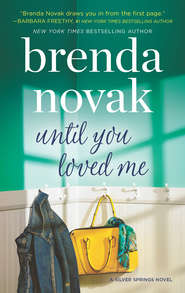По всем вопросам обращайтесь на: info@litportal.ru
(©) 2003-2024.
✖
Cold Feet
Автор
Год написания книги
2018
Настройки чтения
Размер шрифта
Высота строк
Поля
Brianna said nothing. She folded her arms around her stuffed toy and jutted out her sharp little chin.
“She’s not happy about renting out the carriage house,” Madison explained. “She called her father last night and he told her—” she waved her hand “—oh, never mind. I’ve got the key right here. Why don’t we take a look inside?”
Caleb realized that now was probably a good time to explain that he wasn’t who she thought he was. But he didn’t see any need to hurry. It certainly wouldn’t hurt to catch a glimpse of what Madison Lieberman was really like. That could only help him understand her family and, by extension, her father.
“Sounds good,” he said, following her to what she’d labeled the carriage house.
Brianna glanced back at him several times, as if she thought she could scare him away with her dark looks. But he merely smiled and, when Madison swung the door wide, stepped past her.
The place smelled like an expensive candle store, Caleb decided as he began to notice several things he’d missed before—the vase of fresh wildflowers on the kitchen table, the small shower in the bathroom he’d been unable to see from the window, the mahogany entertainment center in the bedroom that housed another television.
“You know, from your voice, I thought you’d be older,” Madison said as she watched him look around.
Opening what appeared to be a pantry, he pretended not to hear her. “How soon did you want to get someone in here?”
“As you can see, it’s ready. I’ve had a phone installed and everything. You could move in tomorrow.”
The hope in her voice and the modest car she was driving reinforced Caleb’s impression that, considering Danny Lieberman’s wealth, she hadn’t managed to get a very good divorce settlement. “How long has it been on the market?”
“A little over a month. But I’ve lowered the price.” She tucked a strand of hair behind one ear in a self-conscious movement. “I’m only asking eight hundred.”
He nodded and walked back into the living room, wondering how to turn the conversation to her father—while feeling a peculiar reluctance to do so. “This place is small but…nice,” he said.
Brianna was sitting on the couch with her stuffed rabbit and had spread several sheets of paper on the coffee table in front of her.
“These are very good,” he said when he realized they were sketches, and that she meant for him to see them. “Who drew them?”
“My mom.”
He studied the first, a pencil drawing of an old, gnarled hand gripping a cane, then the second, a set of clasped hands—one male, the other female—and the last, an intriguing pair of eyes. Were they Ellis Purcell’s eyes? Caleb could have sworn they were. They seemed to hold all kinds of dark secrets.
He wondered if Madison knew those dark secrets, and if he’d ever be able to get them out of her.
“Brianna, what are you doing with my sketches?” Madison asked, coming up from behind.
“I think she’s proud of you,” Caleb said. “And it looks as though she has reason to be. You’re very talented.”
Madison quickly gathered up her drawings. “Thanks, but it’s just a hobby.” After setting them aside, she clasped her hands in a businesslike manner. “So, do you like it? Do you want the place?”
He was about to explain that he hadn’t really come to rent the carriage house when there was a knock on the door.
Brianna grabbed her stuffed rabbit and ran to open it. A tall, white-haired gentleman who looked to be in his late fifties stood on the stoop. “Is your mommy here?”
Brianna turned expectantly, and Madison approached the door. “Can I help you?”
“I’m Dwight Sanderson.”
“Who?” she said.
Caleb watched the man’s face cloud with confusion at Madison’s startled reaction. “I spoke with you a few days ago and then again this morning, remember? I’m here to see the house.”
“But—”
“I’m afraid you’re too late,” Caleb interrupted, joining them at the door. “It’s already taken.”
Madison blinked at him in surprise, and Caleb felt a good measure of surprise himself. What the hell did he think he was doing?
“I thought you were…Who are you?” Madison asked, turning to him.
“Caleb Trovato.” He stuck out his hand, fairly confident she’d never recognize his name. He wrote under the pseudonym Thomas L. Wagner, his mother’s grandfather’s name, and had signed the letters he’d sent her and Danny the same way, since they’d been written in a professional capacity.
“Caleb Trovato,” she repeated, hesitantly accepting his handshake. “If you called, my baby-sitter forgot to write it down.”
Her fingers felt slim and dainty, and she was close enough that he could smell a hint of her perfume. “I didn’t call. I just happened to see the sign as I was driving by. I actually live in San Francisco, but business has brought me here.”
“For how long?”
“That remains to be seen.”
“Oh.” She glanced from him to Sanderson. “So is either of you willing to sign a lease?”
“I told you on the phone that I can’t commit long-term,” Sanderson said. “My situation is too tentative right now.”
“I’ll sign a lease,” Caleb said, even though he knew he was crazy to offer. He’d recently furnished his new condo in San Francisco and planned to return there. But he couldn’t miss this opportunity. Maybe now he’d finally be able to crack the Sandpoint Strangler case and achieve some closure—for himself, the public, the force and, most importantly, the families of the victims. Maybe he could even ease the foreboding that had settled over him since he’d learned of Susan’s disappearance. If the deceased Purcell was really the Sandpoint Strangler, she certainly stood a better chance of being found alive. Random murders were rare. Most homicides of women were the result of a love relationship gone bad and, according to Holly, Susan hadn’t been involved with anyone for over three years. She’d only been seeing Lance, the guy she was dating before she disappeared, for a couple of months.
In any case, Caleb could look for Susan from here just as easily as his parents’ place on Fidalgo, and simply buy out the lease when he was ready to head home.
“Do you have any pets?” she asked.
“Would that be a problem?”
“Not necessarily. One dog or cat would be fine. I’m not sure I’d be happy with a whole houseful of Doberman pinschers.”
“No animals.”
“Not even a hamster?”
“Not even a hamster.”
“What about kids?” she asked.
He cocked an eyebrow. “You don’t want a houseful of those, either?” He could understand it if they were all as sour as her daughter.
“I’d expect you to make sure they don’t trample the flowerbeds.”
“The flowerbeds are safe,” he said. “I don’t have any kids.”
“Fine.” She looked as though she wanted to smile but wouldn’t allow it. “What kind of business brings you to Seattle, Mr. Trovato?”











